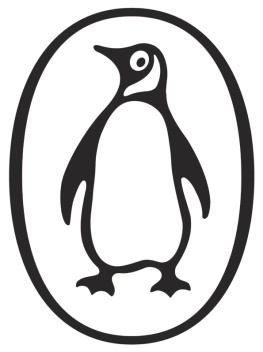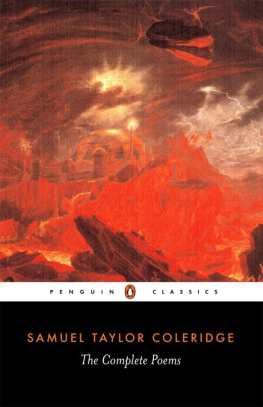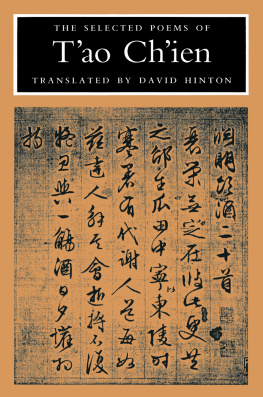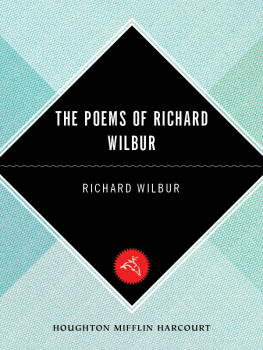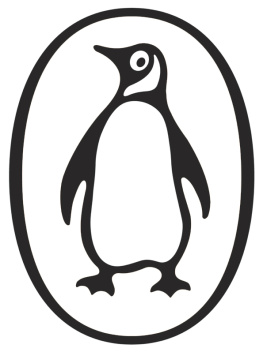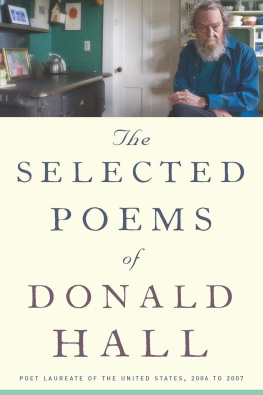
SAMUEL TAYLOR COLERIDGE:
SELECTED POEMS
SAMUEL TAYLOR COLERIDGE was born in 1772 at Ottery St Mary, Devon, the youngest son of a clergyman. A precocious reader and talker as a child, he was educated at Christs Hospital School, London, where he began his friendship with Charles Lamb and wrote his early sonnets, and Jesus College, Cambridge. In 1794 he met Robert Southey and together they planned Pantisocracy, an ideal community to be founded in America, but the project collapsed after a quarrel. Coleridges sonnets were published in the Morning Chronicle, and in 1795 he wrote The Eolian Harp for Sara Fricker, whom he married in the same year, although the marriage was an unhappy one. He first met Dorothy and William Wordsworth in 1797 and a close association developed between them. Coleridge wrote his famous Kubla Khan in the same year, followed in 1798 by Frost at Midnight. In 1798 he and Wordsworth published the Lyrical Ballads, which marked a conscious break with eighteenth-century tradition and included one of Coleridges greatest poems, The Rime of the Ancient Mariner. During a visit to the Wordsworths in 1799 he met Sara Hutchinson, who became his lifelong love and the subject of his Asra poems. In the following year Coleridge and his family settled at Greta Hall, Keswick, where he completed the second part of Christabel, begun in 1798, but also became addicted to opium. In 1804 he separated from his wife and spent the following years in the Mediterranean or London, returning in 1808 to live with the Wordsworths in Grasmere. In 1809 he established The Friend, a political, literary and philosophical weekly journal, which he published regularly over the next year. After a disagreement with Wordsworth in 1810 Coleridge left the Lake District for ever, centring his life thereafter in London, where he gave his Shakespeare Lectures. He presented his literary and philosophical theories in the two-volume Biographia Literaria, published in 1817, and collected his poems in Sibylline Leaves. In an attempt to control his opium addiction, he entered the household and care of Dr James Gillman at Highgate in 1816. Here he was to remain for the last eighteen years of his life, writing a number of late confessional poems and prose works, including Aids to Reflection, published in 1825. Coleridge died in 1834, having overseen a final edition of his Poetical Works.
Poet, philospher and critic, Coleridge stands as one of the seminal figures of his time. William Hazlitt wrote: His thoughts did not seem to come with labour and effort; but as if borne on the gusts of genius, and as if the wings of his imagination lifted him from off his feet, and Wordsworth called him the only wonderful man I ever knew.
RICHARD HOLMES was born in 1945 and educated at Churchill College, Cambridge. His books include Shelley: The Pursuit (1974), which won the Somerset Maugham Award; Footsteps (1985), hailed by Michael Holroyd as a modern masterpiece; Coleridge: Early Visions (1989), which won the Whitbread Book of the Year Prize, and its companion volume, Coleridge: Darker Reflections (1998), winner of the Duff Cooper Prize; Dr Johnson & Mr Savage (1993), which won the James Tait Black Memorial Prize; The Romantic Poets and their Circle (1997); and Sidetracks (2000). He has presented biographic works of Mary Wollstonecraft, William Godwin and Rudyard Kipling for Penguin Classics and a highly praised critical study of Coleridge for Oxford Past Masters. He has also made several radio documentaries, one of which, The Nightwalking (1995), received a Sony Award. Richard Holmes is a Fellow of the Royal Society of Literature, a Fellow of the British Academy and, in 1992, was made an OBE.
SAMUEL TAYLOR COLERIDGE
SELECTED POEMS

Edited with an Introduction and Notes by
RICHARD HOLMES
PENGUIN BOOKS
PENGUIN BOOKS
Published by the Penguin Group
Penguin Books Ltd, 80 Strand, London WC2R 0RL, England
Penguin Putnam Inc., 375 Hudson Street, New York, New York 10014, USA
Penguin Books Australia Ltd, 250 Camberwell Road, Camberwell, Victoria 3124, Australia
Penguin Books Canada Ltd, 10 Alcorn Avenue, Toronto, Ontario, Canada M4V 3B2
Penguin Books India (P) Ltd, 11 Community Centre, Panchsheel Park, New Delhi 110 017, India
Penguin Books (NZ) Ltd, Cnr Rosedale and Airborne Roads, Albany, Auckland, New Zealand
Penguin Books (South Africa) (Pty) Ltd, 24 Sturdee Avenue, Rosebank 2196, South Africa
Penguin Books Ltd, Registered Offices: 80 Strand, London WC2R 0RL, England
www.penguin.com
First published by HarperColllins Publishers 1996
Published in Penguin Books 1996
Introduction and editorial matter
copyright Richard Holmes, 1994
All rights reserved
The moral right of the editor has been asserted
Except in the United States of America, this book is sold subject to the condition that it shall not, by way of trade or otherwise, be lent, re-sold, hired out, or otherwise circulated without the publishers prior consent in any form of binding or cover other than that in which it is published and without a similar condition including this condition being imposed on the subsequent purchaser
ISBN: 9781101493137
LIST OF POEMS
INTRODUCTION
COLERIDGE IS A GREAT and daring poet. His presence is felt echoing through the English language by anyone who has heard the magical names of Kubla Khan or Christabel or The Ancient Mariner. But he is also an unknown poet, much of whose work has been neglected for many years, and whose range and skill has never been properly appreciated. The Poet, he once said, is the man made to solve the riddle of the Universe.
The aim of this new selection of one hundred and one poems is to transform Coleridges reputation, and find him a new generation of readers. What did the older generation think of him? From T. S. Eliot to Ted Hughes, he has been considered as a man briefly visited by the Muse in a period of dazzling intensity, quickly obliterated by the darkness of drugs, metaphysics and obsessive theological speculation. He was thought of as the author of a handful of golden poems (the influential phrase comes from his hostile biographer E.K. Chambers) which were produced in a few inspired months between 1797 and 1798, when Coleridge was intimate with William and Dorothy Wordsworth.
It was held that much of his best poetry was fragmented or unfinished. The critic I. A. Richards even went so far as to say that Coleridge wrote no completed poem to match his fragments. It was generally considered that his inspiration died at the age of thirty in 1802, after he had written Dejection: An Ode. Coleridge, in other words, was a sort of poetic star-shell or firework, who lit up the sky for one brilliant bursting moment, and then dropped back to earth, burnt out and blackened into prose, conservatism and apologetic piety.
This selection sets out to prove otherwise. It offers a new way into the intellectual scope, the beauty and the fine workmanship of Coleridges poetry over his whole lifetime. Darkness, disaster, drugs and metaphysics certainly feature a great deal in his work (see Limbo, , dated 1805). But these are part of a larger effort of artistic experiment, and psychological exploration, which Coleridge sustained over more than forty years.
He began writing poetry in 1789 at the age of sixteen, and continued to the year before his death. Though he did many other kinds of literary work as a journalist, travel-writer, naturalist, dramatist, critic, public lecturer, philosopher and theologian it is the poetry that gives us the continuing story of his imaginative life, at its deepest symbolic level. His letters (six volumes of them), and even his remarkable Notebooks, do not go further than the poetry (see Human Life, , dated 181415).
Next page
